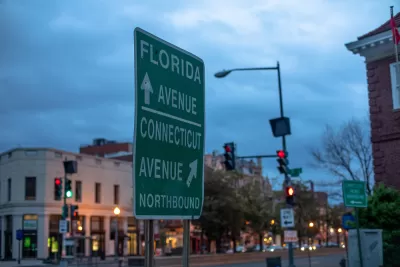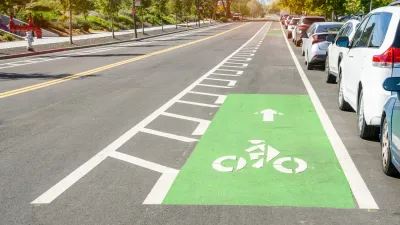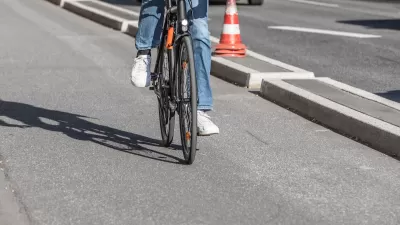After receiving complaints about parking loss and loading zone access, the city will consider revisions to a plan to make Connecticut Avenue safer for people on bikes, pedestrians, and transit users.

According to an article by Luz Lazo in The Washington Post, Washington, D.C. transportation officials are backing down on a plan to add bike lanes and safer pedestrian infrastructure to Connecticut Avenue. “D.C. transportation officials said they will work on design changes to address concerns about the loss of parking, effects on businesses, and access for people with disabilities and seniors along the busy commuter route in Northwest Washington.”
As Luz explains, “The planned transformation of Connecticut Avenue includes a northbound and southbound bike lane, new left- and right-turn lanes at some intersections, the relocation of bus stops to safer spots, pedestrian refuge islands, curb extensions and the prohibition of right turns on red lights.” While the revision is yet to be determined, “Officials said the city probably will stick with its original plan of a bike lane in each direction, with adjustments that include better loading access and parking alternatives.”
People who use Connecticut Avenue for biking say the street is “extremely dangerous and unsafe” for cyclists. One resident, Eztra Deutsch-Feldman, told the Post, “I know that for every rider brave enough to ride on [Connecticut Avenue] now, there are dozens more who want to ride on it but don't feel safe doing so.”
FULL STORY: In D.C., Connecticut Avenue bike lane plan to be revised

Planetizen Federal Action Tracker
A weekly monitor of how Trump’s orders and actions are impacting planners and planning in America.

Restaurant Patios Were a Pandemic Win — Why Were They so Hard to Keep?
Social distancing requirements and changes in travel patterns prompted cities to pilot new uses for street and sidewalk space. Then it got complicated.

Map: Where Senate Republicans Want to Sell Your Public Lands
For public land advocates, the Senate Republicans’ proposal to sell millions of acres of public land in the West is “the biggest fight of their careers.”

Maui's Vacation Rental Debate Turns Ugly
Verbal attacks, misinformation campaigns and fistfights plague a high-stakes debate to convert thousands of vacation rentals into long-term housing.

San Francisco Suspends Traffic Calming Amidst Record Deaths
Citing “a challenging fiscal landscape,” the city will cease the program on the heels of 42 traffic deaths, including 24 pedestrians.

California Homeless Arrests, Citations Spike After Ruling
An investigation reveals that anti-homeless actions increased up to 500% after Grants Pass v. Johnson — even in cities claiming no policy change.
Urban Design for Planners 1: Software Tools
This six-course series explores essential urban design concepts using open source software and equips planners with the tools they need to participate fully in the urban design process.
Planning for Universal Design
Learn the tools for implementing Universal Design in planning regulations.
Heyer Gruel & Associates PA
JM Goldson LLC
Custer County Colorado
City of Camden Redevelopment Agency
City of Astoria
Transportation Research & Education Center (TREC) at Portland State University
Camden Redevelopment Agency
City of Claremont
Municipality of Princeton (NJ)





























